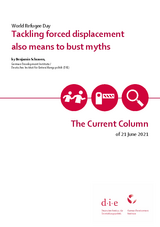The Current Column
World Refugee Day
Tackling forced displacement also means to bust myths
Schraven, BenjaminThe Current Column (2021)
Bonn: German Development Institute / Deutsches Institut für Entwicklungspolitik (DIE), The Current Column of 21 June 2021
A glance at newspaper articles, speeches or public debates about the root causes of displacement is enough to see that they are packed full of misconceptions and myths. This includes the assumption that Europe is in the early days of a huge wave of immigration from Africa or other parts of the Global South. Terms such as “exodus” (in German: “Völkerwanderung”) or “mass migration” (in German: “Massenmigration”) are being bandied about, and not just by those on the political right. Human mobility is being turned into a blanket threat, and even the distinction between “migration” and “displacement” is rarely made these days. The root causes of migration or displacement are also heavily simplified in the media and the political arena: individual factors such as poverty, population growth, the coronavirus pandemic or climate change are quickly and readily being pounced upon as the main reasons behind displacement. Viewed like this, forced migration cannot be anything other than the result of a simple stimulus-response pattern: the more severe the poverty or the impact of climate change, the more displacement occurs – and that’s that: the mathematics of displacement!
Looking at the latest research, however, it is clear that displacement and migration have highly complex, multi-layered root causes with political, social, economic and environmental dimensions. We should also avoid pointing the finger simplistically at the “main culprits” when considering what displacement and expulsion in the countries of Africa, Asia or Latin America actually have to do with our lives and economic activities in the Global North. Colonialism or historical greenhouse gas emissions by OECD countries, for instance, undoubtedly play a role in many of the processes of displacement under way in the Global South, and we need to take responsibility for that. At the same time, though, it does not release local elites from their responsibility. This also means that the root causes of displacement must primarily be tackled by the affected countries themselves. Development policy can only play a supporting role. And even if traditional motivations for migrating (e.g. a quest for better economic prospects) are conflated with actual reasons for displacement (e.g. conflicts), e.g. in the case of migration from sub-Saharan Africa, which Europeans term “irregular”, fleeing a country plagued by civil war is genuinely not comparable with starting a new job in a different country, for instance. We also need to keep reminding ourselves that most global migration and refugee movements happen within the Global South itself (e.g. within West Africa). Finally, the widespread poverty in these regions is preventing any large-scale migration towards Europe. But this South-South migration can also have a decidedly positive economic impact: money that migrants send to their families back in their countries of origin are a global economic factor that enables millions of households in the Global South to improve their livelihoods.
The root causes of displacement cannot be lessened by making them less complex. Myths and blanket statements appear to offer simple explanations and speak to people on an emotional level. However, the diverse nature of human mobility and of its causes, consequences and accompanying circumstances calls for more nuanced approaches. The worlds of politics, media and society should engage in a more profound debate, and politicians need to take the oft-voiced intention to “fight the causes of displacement, not the refugees” seriously. This means campaigning for a reduction in the root causes of displacement, better support for refugees in their main destination countries and an (im)migration policy that is committed to balancing the interests of everyone involved. Domestic policy also needs to step up to the plate here. Clinging to broad-brush (and erroneous) assumptions soon leads to political fallacies, disappointments or conflicting developments. One example of this is the EU’s Emergency Trust Fund for Africa (EUTF), which is based firmly on the assumption that economic stimulus and border security measures will help prevent irregular migration and displacement. Unfortunately, growing numbers of refugees in the Sahel, one of the priority regions for the EUTF, are casting significant doubt on this assumption. If we do not call the myths of this “fight against the root causes of displacement” more critically into question, therefore, even things designed to aid this fight that are as sophisticated as the recommendations of the German government’s “Commission on the Root Causes of Displacement”, for instance, will be of no use either.


